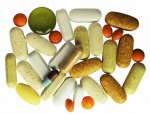 The list of health benefits associated with zinc is without a doubt impressive. This mineral is responsible for helping your body to grow properly when you are young and to maintain your body as you grow old. Zinc is needed for wounds to heal properly and to clot blood. Without enough zinc, your thyroid can’t operate on all cylinders and your immune system isn’t nearly as strong as it should be.
The list of health benefits associated with zinc is without a doubt impressive. This mineral is responsible for helping your body to grow properly when you are young and to maintain your body as you grow old. Zinc is needed for wounds to heal properly and to clot blood. Without enough zinc, your thyroid can’t operate on all cylinders and your immune system isn’t nearly as strong as it should be.
It’s not surprising, then, that zinc supplementation can play a big role in helping to prevent disease. Let’s take a look at the amazing array of conditions that zinc could potentially help to heal or prevent.
- Zinc and Diarrhea
Both the United Nations Children’s Fund and the World Health Organization have recommended zinc in the treatment of acute diarrhea in children. Researchers from Seattle, Washington recently tested zinc’s ability to help with this potentially threatening condition. They found that zinc was the most preferred treatment by caregivers and the one most likely to successfully treat diarrhoeal symptoms when compared with antibiotics and home remedies.
- Zinc and Depression
Researchers from the University of Toronto have stated that zinc is an essential micronutrient that plays a diverse role in cell growth and death, and metabolic and immune function. Zinc was also singled out for its role in brain function. It was this latter effect that prompted the Canadian research team to study the blood zinc concentrations between non-depressed and depressed patients. They looked at seventeen studies and found a definite association between depression and low levels of zinc.
- Zinc and Macular Degeneration
Scientists from the Research Center on Aging at Tufts University in Boston examined the evidence for zinc supplementation in treatment of macular degeneration. Ten trials were reviewed and the research team found that zinc treatments were reported to significantly reduce the risk for advanced age-related macular degeneration (AMD) and to improve visual acuity in those with early AMD.
- Zinc and Prostate Cancer
Researchers from the Fox Chase Cancer Center in Philadelphia noted that the prostate gland accumulates more zinc than any other soft tissue in the body. However, when prostate cancer appears, zinc levels drop dramatically. This change in zinc concentrations seems to be linked to the progression of prostate cancer. They suggested that zinc supplementation could reverse the progression of this disease.
- Zinc and E. coli
Here’s another potential preventative effect of zinc that you might not know about: fighting off E. coli. E. coli can be very dangerous when it invades the body. E. coli usually settles in the digestive tract and can cause severe anemia or even kidney failure. This pathogen is found worldwide and remains an ongoing concern, especially when it turns up in the water supply or contaminates food. Researchers have recently discovered that zinc was able to diminish the bacteria’s ability to reproduce and also seemed to make the remaining E. coli bacteria less virulent.
To boost your dietary intake of zinc, try to increase your intake of seafood (oysters in particular), nuts, legumes, and whole grains.
Source(s) for Today’s Article:
Medeiros, P., et al., “The micronutrient zinc inhibits EAEC strain 042 adherence, biofilm formation, virulence gene expression, and epithelial cytokine responses benefiting the infected host,” Virulence. August 19, 2013; 4(7).
Simpson, E., et al., “Survey of caregivers in Kenya to assess perceptions of zinc as a treatment for diarrhea in young children and adherence to recommended treatment behaviors,” J Glob Health. June 2013; 3(1): 10405.
Herrmann, N., et al., “Zinc in Depression: A Meta-Analysis,” Biol Psychiatry. June 24, 2013.
Chung, M., et al., “A systematic review on zinc for the prevention and treatment of age-related macular degeneration,” Invest Ophthalmol Vis Sci. June 12, 2013; 54(6): 3,985-98.
Kolenko, V., et al., “Zinc and zinc transporters in prostate carcinogenesis,” Nat Rev Urol. April 2013; 10(4): 219-26.
